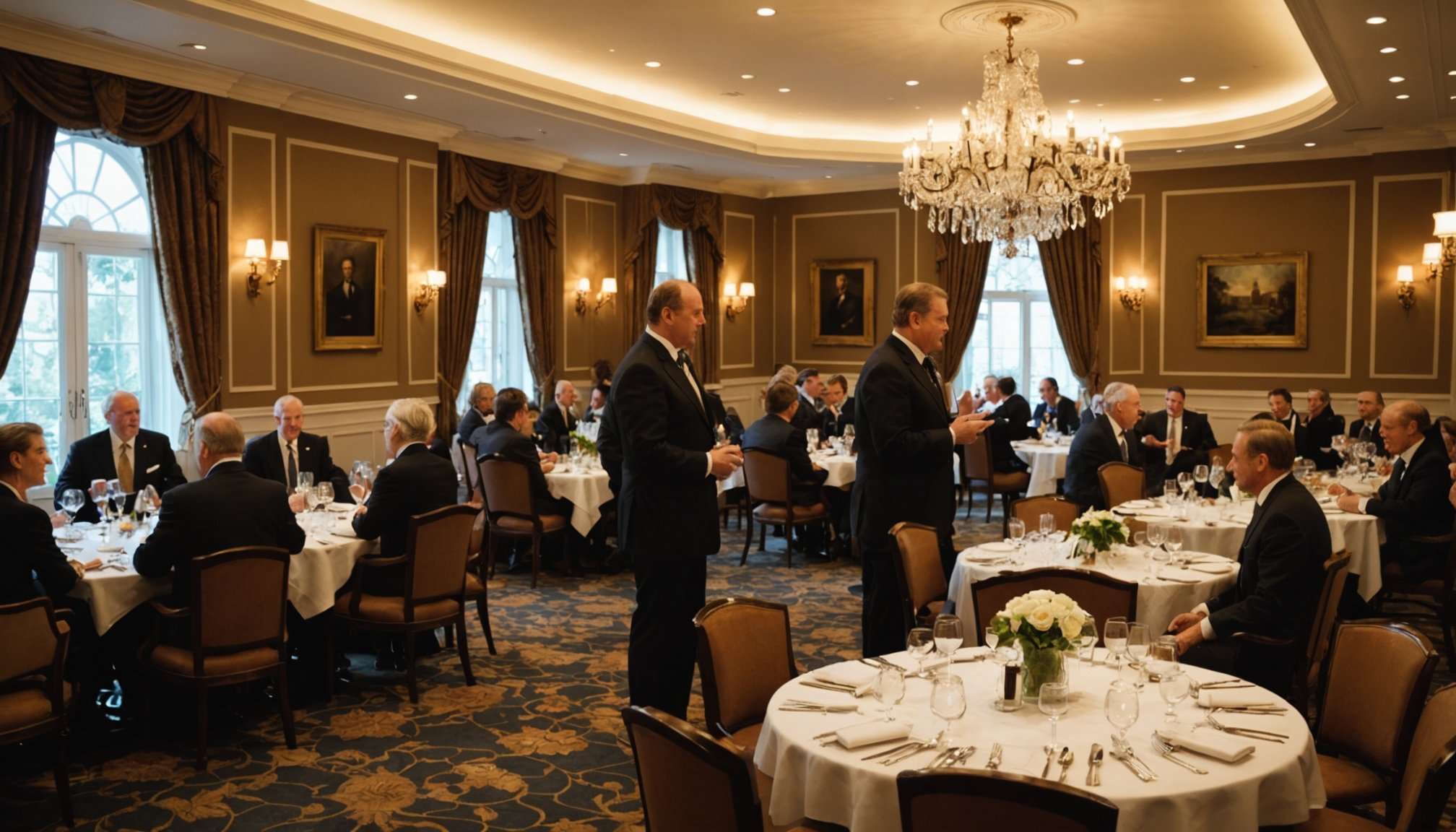Training Strategies for Upscale Dining
In the world of upscale dining, tailoring training methods to the specific needs of high-end service is essential. A bespoke training program recognizes that each restaurant has its own unique atmosphere and customer expectations. Therefore, designing immersive training sessions that mimic real dining experiences helps staff familiarize themselves with the demands of their role. These sessions could involve role-playing common scenarios, helping employees navigate through the nuances of high-end service.
Furthermore, ongoing evaluation and feedback mechanisms play a crucial role in staff development. Regular feedback not only guides employees in honing their skills but also reinforces the quality of service provided. Implementing a system where performance is consistently reviewed ensures that staff maintains high standards and adapts to evolving customer expectations.
Also read : Transform Your Bar Vibe: Expert Tips to Craft a Warm Ambiance with Live Music Events
Upscale dining service relies heavily on a well-rounded and adaptable team. By investing in comprehensive training methods, restaurants can cultivate a staff well-versed in delivering exceptional service. This strategic approach not only enhances the dining experience but also contributes to the establishment’s overall reputation, ensuring guests return for more memorable meals.
Role-Playing Scenarios
Integrating role-playing into upscale dining training offers a dynamic way to enhance the customer service experience. By developing realistic scenarios, staff can practice navigating complex interactions that reflect their daily responsibilities. This method helps in fine-tuning both verbal and non-verbal communication skills crucial for effective guest relations.
Also to read : Transform Leftover Cuisine: Cost-Saving Hacks to Minimize Food Waste in Restaurants
Developing Realistic Scenarios
Creating realistic scenarios is foundational in scenario training. Tailoring these exercises to common situations allows employees to engage deeply with potential challenges, promoting adaptability and quick thinking. This remarkably mirrors real-life dining experiences, better preparing staff for diverse guest interactions.
Incorporating Common Dining Situations
Aligning role-play with typical dining moments is essential. These scenarios can cover frequent events, such as handling specific dietary requests or managing table turnover efficiently. Incorporating diverse settings not only provides variety but also ensures comprehensive staff development.
Measuring Role-Play Effectiveness
Evaluating the effectiveness of role-playing is vital to ensure it’s a worthwhile training method. By setting clear performance metrics and soliciting feedback post-session, restaurants can measure improvement areas and make necessary adjustments. Monitoring progress thus keeps the training relevant and aligned with upscale dining service expectations.
Focusing on these detailed strategies helps facilitate the delivery of superior service, vital in a high-end dining atmosphere. This approach guarantees that staff remain responsive to the ever-evolving dynamics of customer interactions.
Advanced Communication Skills
In upscale dining environments, mastering both verbal and non-verbal communication skills is paramount for delivering exceptional service. Staff members can enhance guest relations through effective communication techniques that ensure clear and empathetic interactions.
Essential Communication Techniques
Active listening is crucial. By attentively hearing guests’ needs, staff can better tailor their service, improving satisfaction. Notably, acknowledging guest concerns and providing swift resolutions demonstrates a commitment to service excellence. Non-verbal cues such as eye contact, smiling, and body language significantly reinforce the elegance of the interaction, creating a welcoming atmosphere.
Personalization and Guest Interactions
Personalization in interactions elevates the guest experience. Utilizing guest names throughout conversation conveys attentiveness and respect. Tailoring service to individual preferences and offering personalized recommendations highlights an establishment’s dedication to individualized care.
Handling Guest Complaints
Handling complaints with professionalism is essential. Techniques include showing empathy, actively listening to the issue, and offering genuine solutions. Quick and efficient resolution of conflicts reflects positively on the restaurant and encourages trust among guests.
By focusing on these communication techniques, upscale dining establishments can cultivate a sophisticated service culture, ensuring each guest interaction is memorable and aligns with high service standards. Excellence in communication fosters strong guest relations and underpins the success of a high-end dining experience.
Enhancing Customer Engagement
In the sphere of upscale dining, increasing customer engagement is an art that merges personalised service and strategic interaction. Building strong relationships with guests necessitates a refined approach, focusing on authentic rapport and anticipating customer needs. Customer engagement strategies become pivotal in creating lasting impressions.
Building Rapport with Guests
Establishing trust through genuine conversation fosters a sense of exclusivity. Upselling techniques should be subtly integrated into interactions, enhancing the dining experience without seeming pushy. Staff trained in these methods can seamlessly introduce guests to new experiences, aligning suggestions with observed preferences.
Upselling and Cross-selling Techniques
Effective upselling and cross-selling strategies require a deep understanding of the menu and guest preferences. Staff should be adept at suggesting complementary dishes and drinks that elevate the dining pleasure. This practice not only boosts revenue but enriches the guest experience, aligning with their taste expectations.
Anticipating Guest Needs and Preferences
An intuitive approach to service can significantly enhance guest satisfaction. Monitoring subtle cues, such as previous dining behaviours and expressed preferences, allows staff to preemptively address needs. This relationship building fosters loyalty, as guests appreciate the attention to detail and tailored service. By consistently refining these engagement methods, upscale dining establishments can elevate customer satisfaction and ensure memorable visits.
Case Studies and Best Practices
Exploring case studies within the upscale dining world reveals actionable insights valued by the industry. By analyzing successful restaurant models, one can glean unique strategies that speak to customer satisfaction and operational excellence.
Analysis of Successful Restaurant Models
Examining establishments renowned for their exceptional service reveals key strategies that set them apart. Notably, many feature structured training programs focusing on cultivating a deep understanding of customer expectations. This tailored approach ensures that employees are equipped to create diverse, memorable dining experiences, reinforcing both brand reputation and guest loyalty.
Key Takeaways from Industry Leaders
Industry leaders highlight the significance of continuous staff development. Their success is often attributed to dynamic training modules that encourage skill growth and adaptability. Core takeaways demonstrate that investing in staff empowerment pays dividends not only in employee morale but also in delivering superior service.
Application of Best Practices in Training
Incorporating best practices involves adopting a holistic training regimen, reflecting industry standards. Practical elements such as role-playing and feedback mechanisms are integral. These forward-thinking practices align training objectives with real-life service requirements, promoting a culture centered on customer-centric values.
These case studies and best practices can serve as a transformative resource, encouraging upscale dining establishments to continually refine their approach, thereby ensuring excellence and guest satisfaction.
Expert Insights and Resources
Gathering insights from industry experts offers valuable guidance for enhancing upscale dining service. Interviews with leaders in the field can provide practical advice and shed light on evolving trends, which helps in staff development. Experts often emphasize the importance of fostering a culture where continuous learning is encouraged. This approach helps employees adapt to new dining trends and maintain a customer-centric focus.
To implement effective training programs, utilizing various training resources is vital. Resources like instructional videos, detailed manuals, and interactive workshops provide a comprehensive foundation. These tools can be tailored to address specific needs within the restaurant, ensuring that every staff member gains the necessary knowledge and skills.
Incorporating structured templates and checklists aids in standardizing training across teams. Templates might include service protocols or checklists for routine tasks, promoting consistency and efficiency in operations. These resources allow staff to focus on delivering high-quality service, thereby enhancing overall guest satisfaction.
By leveraging expert opinions and curated training materials, upscale dining establishments can ensure that staff are well-prepared to deliver exceptional service. This strategic focus on development supports not only service excellence but also the establishment’s broader goals for growth and guest loyalty.

